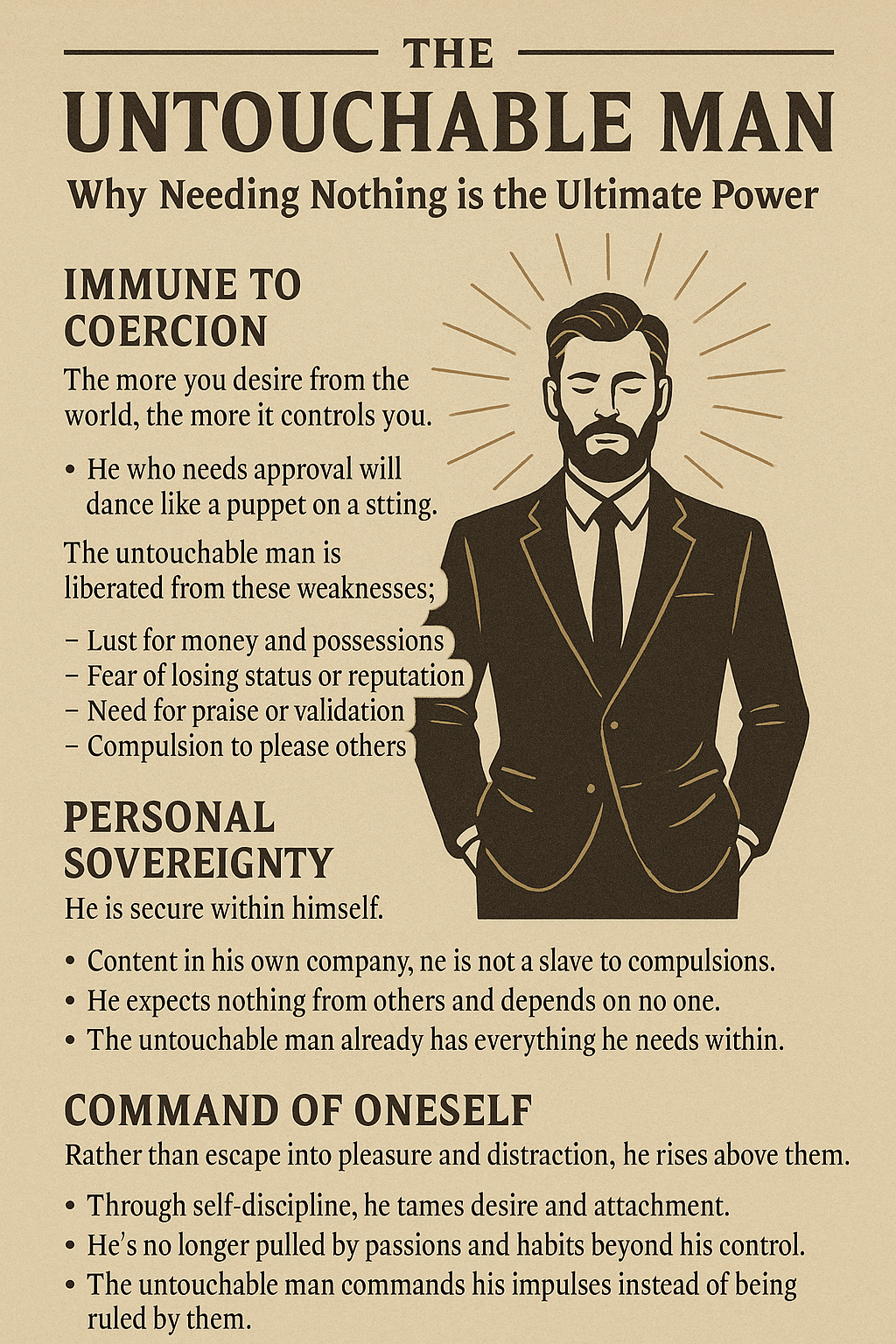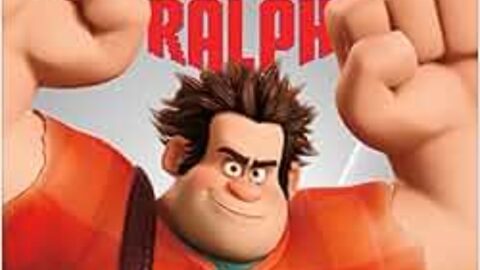Picture a man sitting quietly on a park bench. He isn’t scrolling, posing, or rushing to his next meeting. He isn’t seeking attention or validation. He simply sits in stillness—anchored, calm, and whole. Strangely, he stands out more than the crowd racing around him.
Why? Because he radiates what almost no one else does: a lack of need. And in a world built on want, a man who needs nothing is the most dangerous man of all.
Society’s Addiction to Want
Our modern world isn’t designed to fulfill us—it’s designed to keep us craving. Every screen whispers: “You’re not enough.” Ads scream: “Buy this to be successful, attractive, worthy.” Social media keeps you hooked on the next hit of validation.
This is no accident. If you stop needing, you stop consuming. If you stop consuming, the system rusts. As Carl Jung once warned: “People will do anything, no matter how absurd, to avoid facing their own soul.” Society exploits this by keeping you distracted from yourself—always chasing, never arriving.
Machiavelli’s Warning
Centuries earlier, Machiavelli understood this same principle—but from the ruler’s side of the chessboard. His advice: keep people needy, distracted, and dependent on authority. Why? Because the man who feels whole cannot be ruled.
A man who needs nothing cannot be bought with promises, manipulated by threats, or bribed with status. He is ungovernable, not through rebellion, but through clarity. And that makes him the ultimate threat to any system built on control.
Jung’s Path to Wholeness
Jung called the journey inward individuation: becoming your true self instead of the mask society hands you.
- Persona: The mask you wear to be liked, to perform, to avoid rejection.
- Shadow: The repressed parts of yourself—anger, lust, ambition—that you were told to deny.
- Integration: The dangerous man doesn’t run from these parts; he accepts and integrates them.
The result is authenticity. He doesn’t crave applause, nor does he fear criticism. He is rooted in himself, not the shifting winds of public opinion.
The Power of Needlessness
Such a man is not cold or detached—he is simply not ruled. His strength begins with solitude. While most people run from silence, he embraces it. He doesn’t seek consensus or popularity; his meaning comes from within. He is immune to bribery because he is not led by lack.
This independence makes him incorruptible. You cannot buy, break, or bait him. And that is what terrifies a world built on control.
Four Pillars of Inner Sovereignty
A man who needs nothing stands on four foundations:
- Psychological fullness – He has made peace with his past and no longer needs outside validation.
- Moral clarity – He lives by a code he chose and tested, not one inherited blindly.
- Intellectual courage – He questions dogma and seeks truth, even when uncomfortable.
- Willpower – He refuses submission, standing rooted even under pressure.
The Price and Reward
This path is not glamorous. Such a man will be misunderstood, labeled cold, arrogant, or distant. Shallow relationships fall away. The old version of himself—the one who begged for approval—must die.
But what he gains is priceless: freedom. Not the marketed illusion of choice, but inner sovereignty. Freedom from manipulation, freedom from fear, freedom from betrayal of the self.
The Final Rebellion
In a world addicted to desire, the man who needs nothing is a glitch in the system. He cannot be programmed, bribed, or broken. His mere presence is subversive—a reminder that there is another way to live.
He loves because it’s real, not to be loved in return. He speaks to express, not to impress. He walks his path because it’s his, not because it wins approval.
That is the true untouchable man. Not violent, not rebellious—simply whole.
And wholeness, in a world built on lack, is the ultimate act of defiance.
Stay silent. Stay solid. Stay dangerous.
Here’s a point-by-point breakdown of the transcript:
Opening Scene
- A man sits alone on a park bench, doing nothing—simply present.
- Unlike others rushing, scrolling, performing, he radiates peace and stillness.
- His lack of need makes him stand out more than those striving for attention.
- He is “dangerous” not because he wants power, but because he doesn’t need it.
- This detachment makes him free from society’s invisible chains.
Society’s Structure of Need
- Modern society is built on want and consumption.
- If people stop craving, the consumer machine breaks.
- Ads and screens constantly reinforce: “You’re not enough.”
- Validation, products, attention, and status are tools of mind control.
- Carl Jung quote: People will do anything to avoid facing their soul.
- Facing the soul reveals how much identity is built on artificial desires.
Historical Context (Machiavelli)
- Machiavelli advised rulers: never let the people feel whole.
- Keep them distracted, needy, dependent on authority.
- A man who needs nothing is ungovernable—immune to threats or promises.
- This independence threatens systems of control.
The Path of Individuation (Jung)
- Jung’s concept: individuation—becoming your true self.
- Process involves confronting two forces:
- Persona: the mask worn to fit into society.
- Shadow: repressed parts of the self (anger, fear, ambition, etc.).
- Most avoid the shadow; the strong man integrates it.
- Integration leads to wholeness, authenticity, and rootedness.
Why He’s Dangerous
- He no longer craves approval or fears rejection.
- He’s authentic, not performing for society’s validation.
- Such a man acts as a mirror—reminding others of their avoidance.
- Machiavelli and rulers feared men immune to fear and hope, since they can’t be manipulated.
The System vs. The Self-Sufficient Man
- Systems (political, economic, social) depend on manipulating desires/fears.
- A man who transcends need breaks this formula.
- He’s not loud or rebellious; he simply walks away.
- That refusal to play makes him more powerful than those who chase status.
Psychological Independence
- Myths dispelled: He’s not cold or detached, just not ruled.
- Core strength: comfort with solitude.
- Doesn’t need consensus or approval to validate his truth.
- Immune to bribery because he isn’t led by lack.
- He becomes incorruptible: can’t be bought, broken, or baited.
Jung’s Full Inner Work
- Process goes deeper:
- Persona: mask.
- Shadow: repressed traits.
- Animus/Anima: inner opposite (for men: inner feminine qualities, for women: inner masculine).
- Self: full integration of conscious/unconscious.
- Outcome: man becomes whole, beyond praise or criticism.
Machiavelli’s Paradox
- Rulers depend on desire for power/status.
- But the man who rejects power becomes paradoxically more respected.
- His refusal to play the game inspires others to question it.
- Needlessness itself becomes a revolutionary act.
Implications Across Society
- Economics: fuels endless consumption by selling identity.
- Politics: thrives on dependency—leaders as parents, citizens as children.
- Psychology: ties worth to attention and likes.
- Man who rejects these illusions becomes “a glitch in the system.”
Four Dimensions of Mastery
A man who needs nothing aligns across:
- Psychology: self-acceptance, independence from validation.
- Morality: living by his own tested code.
- Intellect: questions dogma, thinks independently.
- Will: unshakable under pressure, refuses submission.
The Price of Freedom
- This path isn’t glamorous—he will be misunderstood, labeled cold or arrogant.
- Relationships based on need may fall away.
- He loses the old version of himself that chased approval.
- Gains true freedom: internal sovereignty, untouchable by external manipulation.
Final Challenge
- Freedom = no longer controllable by fear or desire.
- The man who needs nothing can love, speak, and live authentically.
- Call to action:
- Stop begging for approval.
- Question the narratives of worth.
- Integrate shadow and persona.
- Reclaim sovereignty.
- Conclusion: The most dangerous, untouchable man is the one who needs nothing.







